- Home
- Ken Follett
A Dangerous Fortune (1994) Page 38
A Dangerous Fortune (1994) Read online
Page 38
When he had washed and shaved he put on his dressing gown and went into Nora's room. She was expecting him: they always made love on Friday mornings. He had long ago accepted her once-a-week rule. She had become very plump, and her face was rounder than ever, but as a result she had very few lines, and she still looked pretty.
All the same, as he made love to her he closed his eyes and imagined he was with Maisie.
Sometimes he felt like giving up altogether. But these Friday-morning sessions had so far given him three sons whom he loved to distraction: Tobias, named for Hugh's father; Samuel, for his uncle; and Solomon, for Solly Greenbourne. Toby, the eldest, would start at Windfield School next year. Nora produced babies with little difficulty but once they were born she lost interest in them, and Hugh gave them a lot of attention to compensate for their mother's coldness.
Hugh's secret child, Maisie's son Bertie, now sixteen, had been at Windfield for years, and was a prizewinning scholar and star of the cricket team. Hugh paid his fees, visited the school on Speech Day, and generally acted like a godfather. Perhaps this led a few cynical people to suspect that he was Bertie's real father. But he had been Solly's friend, and everyone knew that Solly's father refused to support the boy, so most people assumed he was simply being generously faithful to the memory of Solly.
As he rolled off Nora she said: "What time is the ceremony?"
"Eleven o'clock at Kensington Methodist Hall. And lunch afterwards at Whitehaven House."
Hugh and Nora still lived in Kensington, but they had moved to a bigger house when the boys started coming. Hugh had left the choice to Nora, and she had picked a big house in the same ornate, vaguely Flemish style as Augusta's--a style that had become the height of fashion, or at any rate the height of suburban fashion, since Augusta built her place.
Augusta had never been satisfied with Whitehaven House. She wanted a Piccadilly palace like the Greenbournes. But there was still a measure of Methodist puritanism in the Pilasters, and Joseph had insisted that Whitehaven House was enough luxury for anyone, no matter how rich. Now the house belonged to Edward. Perhaps Augusta would persuade him to sell it and buy her something grander.
When Hugh went down to breakfast his mother was already there. She and Dotty had come up from Folkestone yesterday. Hugh kissed his mother and sat down, and she said without preamble: "Do you think he really loves her, Hugh?"
Hugh did not have to ask whom she was talking about. Dotty, now twenty-three, was engaged to Lord Ipswich, eldest son of the duke of Norwich. Nick Ipswich was heir to a bankrupt dukedom, and Mama was afraid he only wanted Dotty for her money, or rather her brother's money.
Hugh looked fondly at his mother. She still wore black, twenty-four years after the death of his father. Her hair was now white, but in his eyes she was as beautiful as ever. "He loves her, Mama," he said.
As Dotty did not have a father, Nick had come to Hugh to ask formal permission to marry her. In such cases it was usual for the lawyers on both sides to draw up the marriage settlement before the engagement was confirmed, but Nick had insisted on doing things the other way around. "I've told Miss Pilaster that I'm a poor man," he had said to Hugh. "She says she has known both affluence and poverty, and she thinks happiness comes from the people you are with, not the money you have." It was all very idealistic, and Hugh would certainly give his sister a generous dowry; but he was happy to know that Nick genuinely loved her for richer or poorer.
Augusta was enraged that Dotty was marrying so well. When Nick's father died, Dotty would be a duchess, which was far superior to a countess.
Dotty came down a few minutes later. She had grown up in a way Hugh would never have expected. The shy, giggly little girl had become a sultry woman, dark-haired and sensual, strong-willed and quick-tempered. Hugh guessed that quite a lot of young men were intimidated by her, which was probably why she had reached the age of twenty-three without getting married. But Nick Ipswich had a quiet strength that did not need the prop of a compliant wife. Hugh thought they would have a passionate, quarrelsome marriage, quite the opposite of his own.
Nick called, by appointment, at ten, while they were still sitting around the breakfast table. Hugh had asked him to come. Nick sat next to Dotty and took a cup of coffee. He was an intelligent young man, twenty-two years old, just down from Oxford where, unlike most young aristocrats, he had actually sat examinations and got a degree. He had typically English good looks, fair hair and blue eyes and regular features, and Dotty looked at him as if she wanted to eat him with a spoon. Hugh envied their simple, lustful love.
Hugh felt too young to be playing the role of head of the family, but he had asked for this meeting, so he plunged right in. "Dotty, your fiance and I have had several long discussions about money."
Mama got up to leave, but Hugh stopped her. "Women are supposed to understand money nowadays, Mama--it's the modern way." She smiled at him as if he were being a foolish boy, but she sat down again.
Hugh went on: "As you all know, Nick had been planning a professional career, and thinking of reading for the bar, as the dukedom no longer provides a living." As a banker Hugh understood exactly how Nick's father had lost everything. The duke had been a progressive landowner, and in the agricultural boom of the midcentury he had borrowed money to finance improvements: drainage schemes, the grubbing up of miles of hedges, and expensive steam-powered machinery for threshing, mowing and reaping. Then in the 1870s had come the great agricultural depression which was still going on now in 1890. The price of farmland had slumped and the duke's lands were worth less than the mortgages he had taken on them.
"However, if Nick could get rid of the mortgages that hang around his neck, and rationalize the dukedom, it could still generate a very considerable income. It just needs to be managed well, like any enterprise."
Nick added: "I'm going to sell quite a lot of outlying farms and miscellaneous property, and concentrate on making the most of what's left. And I'm going to build houses on the land we own at Sydenham in south London."
Hugh said: "We've worked out that the finances of the dukedom can be transformed, permanently, with about a hundred thousand pounds. So that is what I'm going to give you as a dowry."
Dotty gasped, and Mama burst into tears. Nick, who had known the figure in advance, said: "It is remarkably generous of you." Dotty threw her arms around her fiance and kissed him, then came around the table and kissed Hugh. Hugh felt a little awkward, but all the same he was glad to be able to make them so happy. And he was confident that Nick would use the money well and provide a secure home for Dotty.
Nora came down dressed for the funeral in purple-and-black bombazine. She had taken breakfast in her room, as always. "Where are those boys?" she said irritably, looking at the clock. "I told that wretched governess to have them ready--"
She was interrupted by the arrival of the governess and the children: eleven-year-old Toby; Sam, who was six; and Sol, four. They were all in black morning coats and black ties and carried miniature top hats. Hugh felt a glow of pride. "My little soldiers," he said. "What was the Bank of England's discount rate last night, Toby?"
"Unchanged at two and a half percent, sir," said Tobias, who had to look it up in The Times every morning.
Sam, the middle one, was bursting with news. "Mamma, I've got a pet," he said excitedly.
The governess looked anxious. "You didn't tell me...."
Sam took a matchbox from his pocket, held it out to his mother, and opened it. "Bill the spider!" he said proudly.
Nora screamed, knocked the box from his hand, and jumped away. "Horrible boy!" she yelled.
Sam scrabbled on the floor for the box. "Bill's gone!" he cried, and burst into tears.
Nora turned on the governess. "How could you let him do such a thing!" she yelled.
"I'm sorry, I didn't know--"
Hugh intervened. "There's no harm done," he said, trying to cool the temperature. He put an arm around Nora's shoulders. "You were taken by surprise,
that's all." He ushered her out into the hall. "Come on, everyone, it's time to leave."
As they left the house he put a hand on Sam's shoulder. "Now, Sam, I hope you've learned that you must always take care not to frighten ladies."
"I lost my pet," Sam said miserably.
"Spiders don't really like living in matchboxes anyway. Perhaps you should have a different kind of pet. What about a canary?"
He brightened immediately. "Could I?"
"You'd have to make sure it was fed and watered regularly, or it would die."
"I would, I would!"
"Then we'll look for one tomorrow."
"Hooray!"
They drove to Kensington Methodist Hall in closed carriages. It was pouring rain. The boys had never been to a funeral. Toby, who was a rather solemn child, said: "Are we expected to cry?"
Nora said: "Don't be so stupid."
Hugh wished she could be more affectionate with the boys. She had been a baby when her own mother died, and he guessed that was why she found it so difficult to mother her own children: she had never learned how. All the same she might try harder, he thought. He said to Toby: "But you can cry if you feel like it. It's allowed at funerals."
"I don't think I shall. I didn't love Uncle Joseph very much."
Sam said: "I loved Bill the spider."
Sol, the youngest, said: "I'm too big to cry."
Kensington Methodist Hall expressed in stone the ambivalent feelings of prosperous Methodists, who believed in religious simplicity but secretly longed to display their wealth. Although it was called a hall, it was as ornate as any Anglican or Catholic church. There was no altar, but there was a magnificent organ. Pictures and statues were banned, but the architecture was baroque, the moldings were extravagant and the decor was elaborate.
This morning the hall was packed to the galleries, with people standing in the aisles and at the back. The employees of the bank had been given the day off to attend, and representatives had come from every important financial institution in the City. Hugh nodded to the governor of the Bank of England, the First Lord of the Treasury, and Ben Greenbourne, more than seventy years old but still as straight-backed as a young guardsman.
The family were ushered to reserved seats in the front row. Hugh sat next to his uncle Samuel, who was as immaculate as ever in a black frock coat, a wing collar and a fashionably knotted silk tie. Like Greenbourne, Samuel was in his seventies, and he too was alert and fit.
Samuel was the obvious choice as Senior Partner, now that Joseph was dead. He was the oldest and most experienced of the partners. However, Augusta and Samuel hated each other, and she would oppose him fiercely. She would probably back Joseph's brother Young William, now forty-two years old.
Among the other partners, two would not be considered because they did not bear the Pilaster name: Major Hartshorn and Sir Harry Tonks, husband of Joseph's daughter Clementine. The remaining partners were Hugh and Edward.
Hugh wanted to be Senior Partner--he wanted it with all his heart. Although he was the youngest of the partners, he was the ablest banker of them all. He knew he could make the bank bigger and stronger than it had ever been and at the same time reduce its exposure to the risky kind of loans Joseph had relied on. However, Augusta would oppose him even more bitterly than she would oppose Samuel. But he could not bear to wait until Augusta was old, or dead, before he took control. She was only fifty-eight: she could easily be around in another fifteen years, as vigorous and spiteful as ever.
The other partner was Edward. He was sitting next to Augusta in the front row. He was heavy and red-faced in middle age, and he had recently developed some kind of skin rash which was very unsightly. He was neither intelligent nor hardworking and in seventeen years he had managed to learn very little about banking. He arrived at work after ten and left for lunch around noon, and he quite often failed to return at all in the afternoon. He drank sherry for breakfast and was never quite sober all day, and he relied on his clerk, Simon Oliver, to keep him out of trouble. The idea of his being Senior Partner was unthinkable.
Edward's wife was sitting next to him, which was a rare event. They led quite separate lives. He lived at Whitehaven House with his mother, and Emily spent all her time at their country house, coming to London only for ceremonial occasions such as funerals. Emily had once been very pretty, with big blue eyes and a childlike smile, but over the years her face had set in lines of disappointment. They had no children and it seemed to Hugh that they hated each other.
Next to Emily was Micky Miranda, fiendishly debonair in a gray coat with a black mink collar. Ever since finding out that Micky had murdered Peter Middleton, Hugh had been frightened of him. Edward and Micky were still as thick as thieves. Micky was involved in many of the South American investments the bank had backed over the last ten years.
The service was long and tedious, then the procession from the hall to the cemetery, in the relentless September rain, took more than an hour, because of the hundreds of carriages following the hearse.
Hugh studied Augusta as her husband's coffin was lowered into the ground. She stood under a big umbrella held by Edward. Her hair was all silver, and she looked magnificent in a huge black hat. Surely now, when she had lost the companion of a lifetime, she would seem human and pitiable? But her proud face was carved in stern lines, like a marble sculpture of a Roman senator, and she showed no grief.
After the burial there was a lunch at Whitehaven House for the whole Pilaster extended family, including all the partners with their wives and children, plus close business associates and long-time hangers-on such as Micky Miranda. So that they could all eat together Augusta had put two dining tables end-to-end in the long drawing room.
Hugh had not been inside the house for a year or two, and since his last visit it had been redecorated yet again, this time in the newly fashionable Arab style. Moorish arches had been inserted in the doorways, all the furniture featured carved fretwork, the upholstery was in colorful abstract Islamic designs, and here in the drawing room were a Cairo screen and a Koran stand.
Augusta sat Edward in his father's chair. Hugh thought that was a bit tactless. Putting him at the head of the table cruelly emphasized how incapable he was of filling his father's shoes. Joseph had been an erratic leader but he had not been a fool.
However, Augusta had a purpose as always. Toward the end of the meal she said, with her customary abruptness: "There must be a new Senior Partner as soon as possible, and obviously it will be Edward."
Hugh was horrified. Augusta had always had a blind spot about her son, but all the same this was totally unexpected. He felt sure she could not possibly get her way, but it was unnerving that she should even make the suggestion.
There was a silence, and he realized that everyone was waiting for him to speak. He was regarded by the family as the opposition to Augusta.
He hesitated while he considered how best to handle it. He decided to try for a standoff. "I think the partners should discuss the question tomorrow," he said.
Augusta was not going to let him off that easily. She said: "I'll thank you not to tell me what I may and may not discuss in my own house, young Hugh."
"If you insist." He collected his thoughts rapidly. "There's nothing obvious about the decision, although you, dear Aunt, clearly don't understand the subtleties of the question, perhaps because you have never worked at the bank, or indeed worked at all--"
"How dare you--"
He raised his voice and overrode her. "The oldest surviving partner is Uncle Samuel," he said. He realized he was sounding too aggressive and he softened his voice again. "I'm sure we would all agree that he would be a wise choice, mature and experienced and highly acceptable to the financial community."
Uncle Samuel inclined his head in acknowledgment of the compliment but did not say anything.
Nobody contradicted Hugh--but nobody supported him either. He supposed they did not want to antagonize Augusta: the cowards preferred that he do it on
their behalf, he thought cynically.
So be it. He went on: "However, Uncle Samuel has declined the honor once before. If he should do so again, the eldest Pilaster would be Young William, who is also widely respected in the City."
Augusta said impatiently: "It is not the City that has to make the choice--it is the Pilaster family."
"The Pilaster partners, to be exact," Hugh corrected her. "But just as the partners need the confidence of the rest of the family, so the bank needs to be trusted by the wider financial community. If we lose that trust we are finished."
Augusta seemed to be getting angry. "We have the right to choose whom we like!"
Hugh shook his head vigorously. Nothing annoyed him more than this kind of irresponsible talk. "We have no rights, only duties," he said emphatically. "We're entrusted with millions of pounds of other people's money. We can't do what we like: we have to do what we must."
Augusta tried another tack. "Edward is the son and heir."
"It's not a hereditary title!" Hugh said indignantly. "It goes to the most able."
It was Augusta's turn to be indignant. "Edward is as good as anyone!"
Hugh looked around the table, dramatically holding the gaze of each man for a moment before moving on. "Is there anyone here who will put his hand on his heart and say that Edward is the most able banker among us?"
No one spoke for a long minute.
Augusta said: "Edward's South American bonds have made a fortune for the bank."
Hugh nodded. "It's true that we have sold many millions of pounds' worth of South American bonds in the last ten years, and Edward has handled all that business. But it's dangerous money. People bought the bonds because they trust Pilasters. If one of those governments should default on interest payments, the price of all South American bonds will go through the floor--and Pilasters will be blamed. Because of Edward's success in selling South American bonds our reputation, which is our most precious asset, is now in the hands of a set of brutish despots and generals who can't read." Hugh found himself becoming emotional as he said this. He had helped to build up the reputation of the bank by his own brains and hard work, and it made him angry that Augusta was willing to jeopardize it.

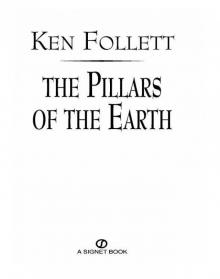 The Pillars of the Earth
The Pillars of the Earth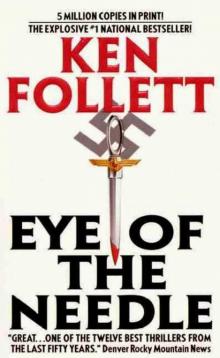 Eye Of The Needle
Eye Of The Needle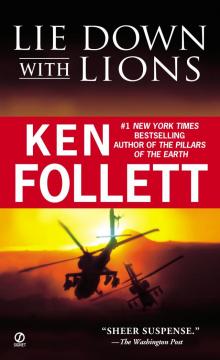 Lie Down With Lions
Lie Down With Lions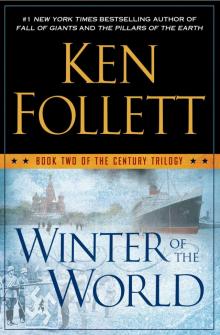 Winter of the World
Winter of the World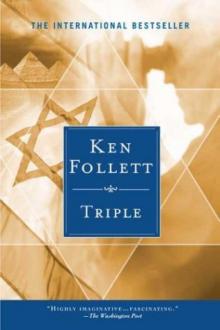 Triple
Triple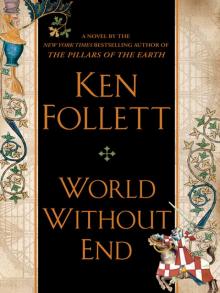 World Without End
World Without End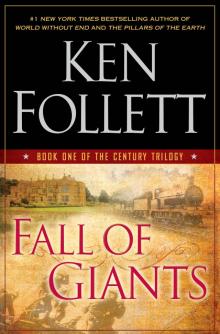 Fall of Giants
Fall of Giants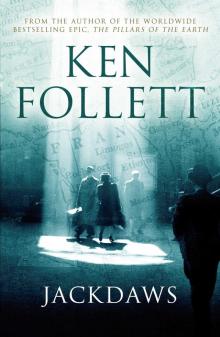 Jackdaws
Jackdaws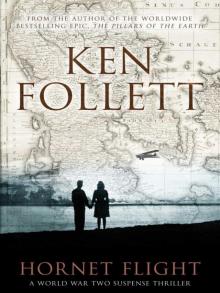 Hornet Flight
Hornet Flight Whiteout
Whiteout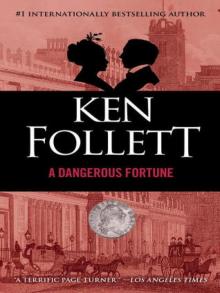 A Dangerous Fortune
A Dangerous Fortune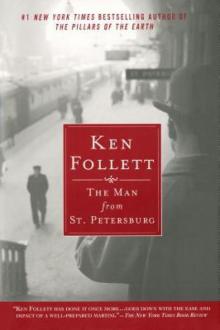 The Man From St. Petersburg
The Man From St. Petersburg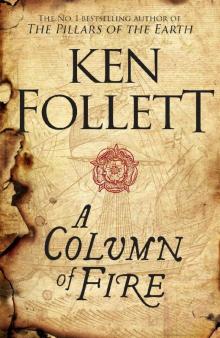 A Column of Fire
A Column of Fire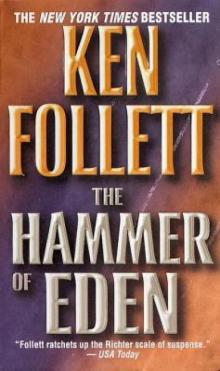 The Hammer of Eden
The Hammer of Eden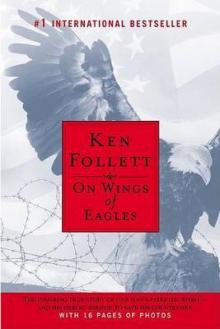 On Wings of Eagles
On Wings of Eagles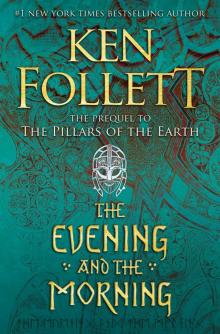 The Evening and the Morning
The Evening and the Morning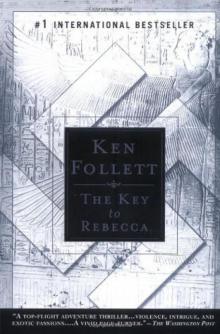 The Key to Rebecca
The Key to Rebecca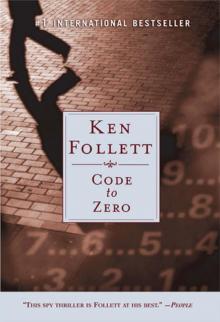 Code to Zero
Code to Zero Paper Money
Paper Money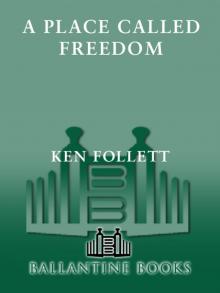 A Place Called Freedom
A Place Called Freedom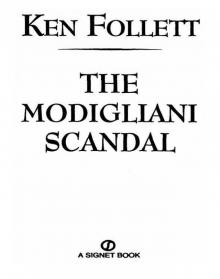 The Modigliani Scandal
The Modigliani Scandal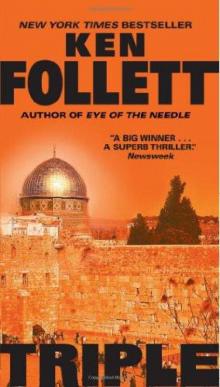 Triple (1991)
Triple (1991)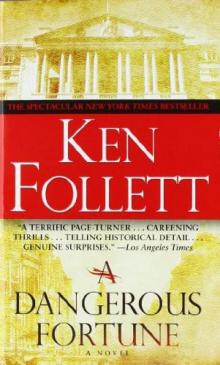 A Dangerous Fortune (1994)
A Dangerous Fortune (1994)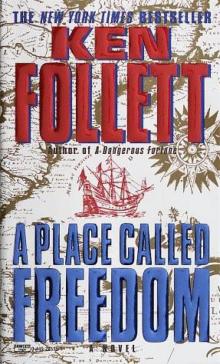 A Place Called Freedom (1995)
A Place Called Freedom (1995)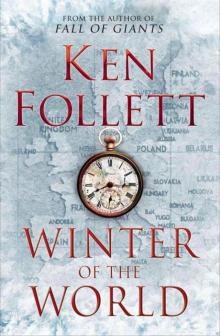 Winter of the World (Century Trilogy 2)
Winter of the World (Century Trilogy 2)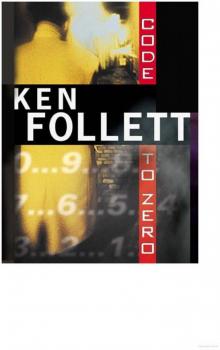 Code to Zero (2000)
Code to Zero (2000)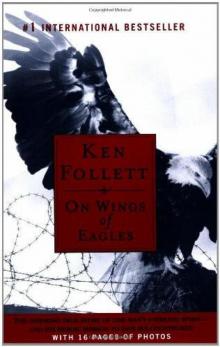 On Wings Of Eagles (1990)
On Wings Of Eagles (1990)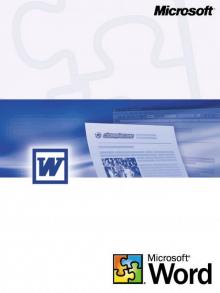 Storm Island
Storm Island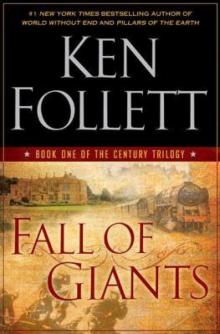 Fall of Giants (The Century Trilogy)
Fall of Giants (The Century Trilogy)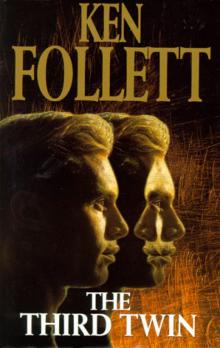 the Third Twin (1996)
the Third Twin (1996)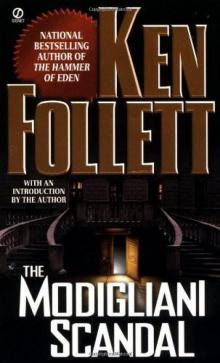 The Modigliani Scandal (1976)
The Modigliani Scandal (1976)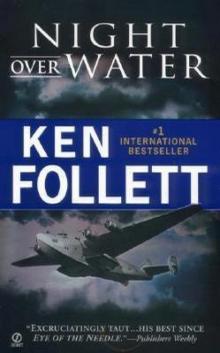 Night Over Water
Night Over Water